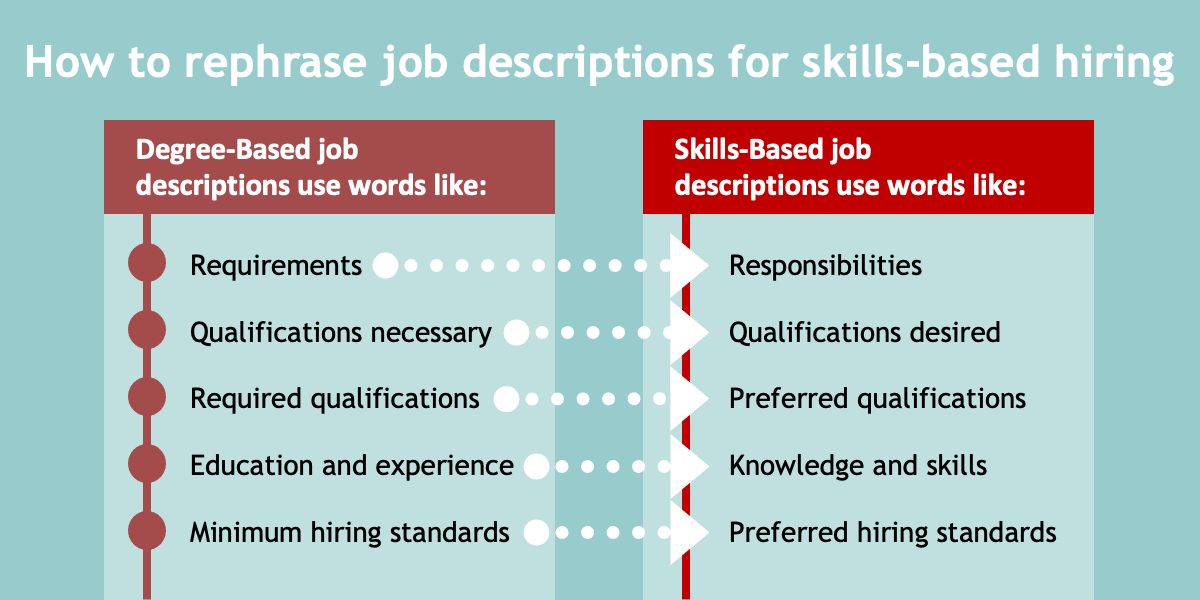In today's fast-paced andcompetitive job market, traditional recruitment methods are no longereffective. Skills-based recruitment strategies have emerged as a revolutionaryapproach, focusing on the skills and competencies required for a specific role ratherthan mere qualifications. This approach has the potential to transformPakistan's workforce, addressing the skills gap and fostering economic growth.
What are Skills-Based Recruitment Strategies?
Skills-based recruitment strategiesprioritize the identification of essential skills and competencies required fora specific job. This approach involves:
- Defining job requirements: Clearly outlining the skills and competencies necessary for a role.
- Assessing candidates: Evaluating candidates based on their skills, experience, and potential.
- Developing talent pipelines: Building a pool of skilled candidates for future vacancies.
Benefits of Skills-Based Recruitment Strategies in Pakistan
1. Bridging the Skills Gap
Pakistan faces a significant skillsgap, with many graduates lacking the skills required by employers. Skills-basedrecruitment strategies address this issue by focusing on the skills needed fora specific role, ensuring that candidates are equipped to meet the demands ofthe job. According to a report by the World Economic Forum, Pakistan ranks113th out of 130 countries in terms of skills development. By adoptingskills-based recruitment strategies, Pakistan can bridge this gap and improveits global competitiveness.
2. Improved Job Fit
By prioritizing skills andcompetencies, employers can find candidates who are better suited for the role,leading to improved job satisfaction, reduced turnover rates, and increasedproductivity. A study by the Society for Human Resource Management found thatemployees who are a good fit for their role are 2.5 times more likely to beengaged and have higher job satisfaction.
3. Enhanced Diversity and Inclusion
Skills-based recruitment strategiespromote diversity and inclusion by considering a broader range of candidates,regardless of their background or qualifications. This approach helps to reduceunconscious bias and ensures that the best candidate is selected for the role.
4. Cost-Effective
This approach reduces the costsassociated with traditional recruitment methods, such as advertising and agencyfees. According to a report by Glassdoor, the average cost of hiring a newemployee in Pakistan is around PKR 50,000-70,000 (approximately USD 300-400).Skills-based recruitment strategies can significantly reduce these costs.
5. Competitive Advantage
Organizations adopting skills-basedrecruitment strategies gain a competitive edge in the job market, attracting toptalent from Pakistan and improving their reputation. A study by the Harvard Business Reviewfound that companies that adopt skills-based recruitment strategies are morelikely to attract high-performing employees and improve their overallperformance.
6. Improved Employee Retention
Skills-based recruitment strategieshelp to identify candidates who are a good fit for the role, leading toimproved employee retention. A study by the Bureau of Labor Statistics foundthat employees who are a good fit for their role are more likely to stay withthe organization for longer periods.
7. Enhanced Employer Brand
Organizations adopting skills-basedrecruitment strategies are seen as attractive employers, enhancing theiremployer brand. A study by the Society for Human Resource Management found thatorganizations with a strong employer brand attract more qualified candidates.

Image Source: vervoe.com
Implementing Skills-Based Recruitment Strategies in Pakistan
1. Adopt a Competency-Based Framework
Develop a framework outlining theessential skills and competencies required for each role. This framework shouldbe based on industry standards and best practices.
2. Utilize Assessment Tools
Implement assessment tools, such asskills tests and behavioral interviews, to evaluate candidates' skills andpotential. These tools help to identify the best candidate for the role andreduce the risk of bias.
3. Develop Talent Pipelines
Establish a talent pipeline bybuilding relationships with potential candidates, ensuring a steady supply ofskilled workers. This approach helps to reduce recruitment costs and ensuresthat the best candidates are available when needed.
4. Provide Training and Development Opportunities
Offer training and developmentprograms to enhance the skills of existing employees and attract new talent.This approach helps to improve employee engagement and retention, reducingturnover rates and improving overall performance.
5. Leverage Technology
Utilize technology, such asapplicant tracking systems and recruitment software, to streamline therecruitment process and improve efficiency.
6. Monitor and Evaluate
Regularly monitor and evaluate theeffectiveness of skills-based recruitment strategies, making adjustments asneeded.
Challenges and Solutions
While skills-based recruitmentstrategies offer numerous benefits, there are challenges associated with theirimplementation. Some of the common challenges include:
- Limited awareness: Many organizations in Pakistan are unaware of the benefits of skills-based recruitment strategies.
- Lack of infrastructure: Some organizations may not have the necessary infrastructure to implement skills-based recruitment strategies.
- Resistance to change: Some organizations may be resistant to changing their traditional recruitment methods.
- Limited access to talent data: Some organizations may not have access to the necessary data to inform their skills-based recruitment strategies.
To address these challenges, it isessential to:
- Raise awareness: Educate organizations about the benefits of skills-based recruitment strategies through workshops, training programs, and industry events.
- Provide support: Offer support and guidance to organizations implementing skills-based recruitment strategies, such as consulting services and best practices.
- Lead by example: Encourage industry leaders to adopt skills-based recruitment strategies, setting a precedent for others to follow.
- Develop talent data platforms: Establish platforms that provide access to talent data, enabling organizations to make informed decisions about their skills-based recruitment strategies.

Image Source: info.daxtra.com
Best Practices for Implementing Skills-Based Recruitment Strategies
- Define clear job requirements: Clearly outline the skills and competencies necessary for each role.
- Use a variety of assessment tools: Utilize a range of assessment tools, such as skills tests, behavioral interviews, and personality assessments.
- Develop a talent pipeline: Establish a pool of skilled candidates for future vacancies.
- Provide training and development opportunities: Offer training and development programs to enhance the skills of existing employees and attract new talent.
- Monitor and evaluate: Regularly monitor and evaluate the effectiveness of skills-based recruitment strategies, making adjustments as needed.
Conclusion
Skills-based recruitment strategiesoffer a transformative solution for Pakistan's workforce, addressing the skillsgap, improving job fit, and promoting diversity and inclusion. By adopting thisapproach, organizations can gain a competitive advantage, reduce costs, andcontribute to the country's economic growth. While there are challengesassociated with implementing skills-based recruitment strategies, these can beaddressed through awareness, support, and best practices.










.webp)

















